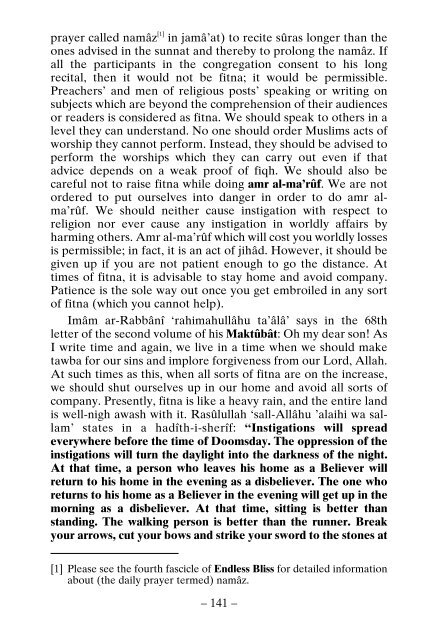Ethics of Islam
Ethics of Islam is taken from the book Berîka by Muhammad Hâdimi. Immorality and ways to get rid of it; 40 depravities and cures to them; usefulness of ethics; what is a soul; strengths of a soul; Personalities emanating from wisdom, courage, chastity and justice are extensively explained.
Ethics of Islam is taken from the book Berîka by Muhammad Hâdimi. Immorality and ways to get rid of it; 40 depravities and cures to them; usefulness of ethics; what is a soul; strengths of a soul; Personalities emanating from wisdom, courage, chastity and justice are extensively explained.
You also want an ePaper? Increase the reach of your titles
YUMPU automatically turns print PDFs into web optimized ePapers that Google loves.
prayer called namâz [1] in jamâ’at) to recite sûras longer than the<br />
ones advised in the sunnat and thereby to prolong the namâz. If<br />
all the participants in the congregation consent to his long<br />
recital, then it would not be fitna; it would be permissible.<br />
Preachers’ and men <strong>of</strong> religious posts’ speaking or writing on<br />
subjects which are beyond the comprehension <strong>of</strong> their audiences<br />
or readers is considered as fitna. We should speak to others in a<br />
level they can understand. No one should order Muslims acts <strong>of</strong><br />
worship they cannot perform. Instead, they should be advised to<br />
perform the worships which they can carry out even if that<br />
advice depends on a weak pro<strong>of</strong> <strong>of</strong> fiqh. We should also be<br />
careful not to raise fitna while doing amr al-ma’rûf. We are not<br />
ordered to put ourselves into danger in order to do amr alma’rûf.<br />
We should neither cause instigation with respect to<br />
religion nor ever cause any instigation in worldly affairs by<br />
harming others. Amr al-ma’rûf which will cost you worldly losses<br />
is permissible; in fact, it is an act <strong>of</strong> jihâd. However, it should be<br />
given up if you are not patient enough to go the distance. At<br />
times <strong>of</strong> fitna, it is advisable to stay home and avoid company.<br />
Patience is the sole way out once you get embroiled in any sort<br />
<strong>of</strong> fitna (which you cannot help).<br />
Imâm ar-Rabbânî ‘rahimahullâhu ta’âlâ’ says in the 68th<br />
letter <strong>of</strong> the second volume <strong>of</strong> his Maktûbât: Oh my dear son! As<br />
I write time and again, we live in a time when we should make<br />
tawba for our sins and implore forgiveness from our Lord, Allah.<br />
At such times as this, when all sorts <strong>of</strong> fitna are on the increase,<br />
we should shut ourselves up in our home and avoid all sorts <strong>of</strong><br />
company. Presently, fitna is like a heavy rain, and the entire land<br />
is well-nigh awash with it. Rasûlullah ‘sall-Allâhu ’alaihi wa sallam’<br />
states in a hadîth-i-sherîf: “Instigations will spread<br />
everywhere before the time <strong>of</strong> Doomsday. The oppression <strong>of</strong> the<br />
instigations will turn the daylight into the darkness <strong>of</strong> the night.<br />
At that time, a person who leaves his home as a Believer will<br />
return to his home in the evening as a disbeliever. The one who<br />
returns to his home as a Believer in the evening will get up in the<br />
morning as a disbeliever. At that time, sitting is better than<br />
standing. The walking person is better than the runner. Break<br />
your arrows, cut your bows and strike your sword to the stones at<br />
[1] Please see the fourth fascicle <strong>of</strong> Endless Bliss for detailed information<br />
about (the daily prayer termed) namâz.<br />
– 141 –

















